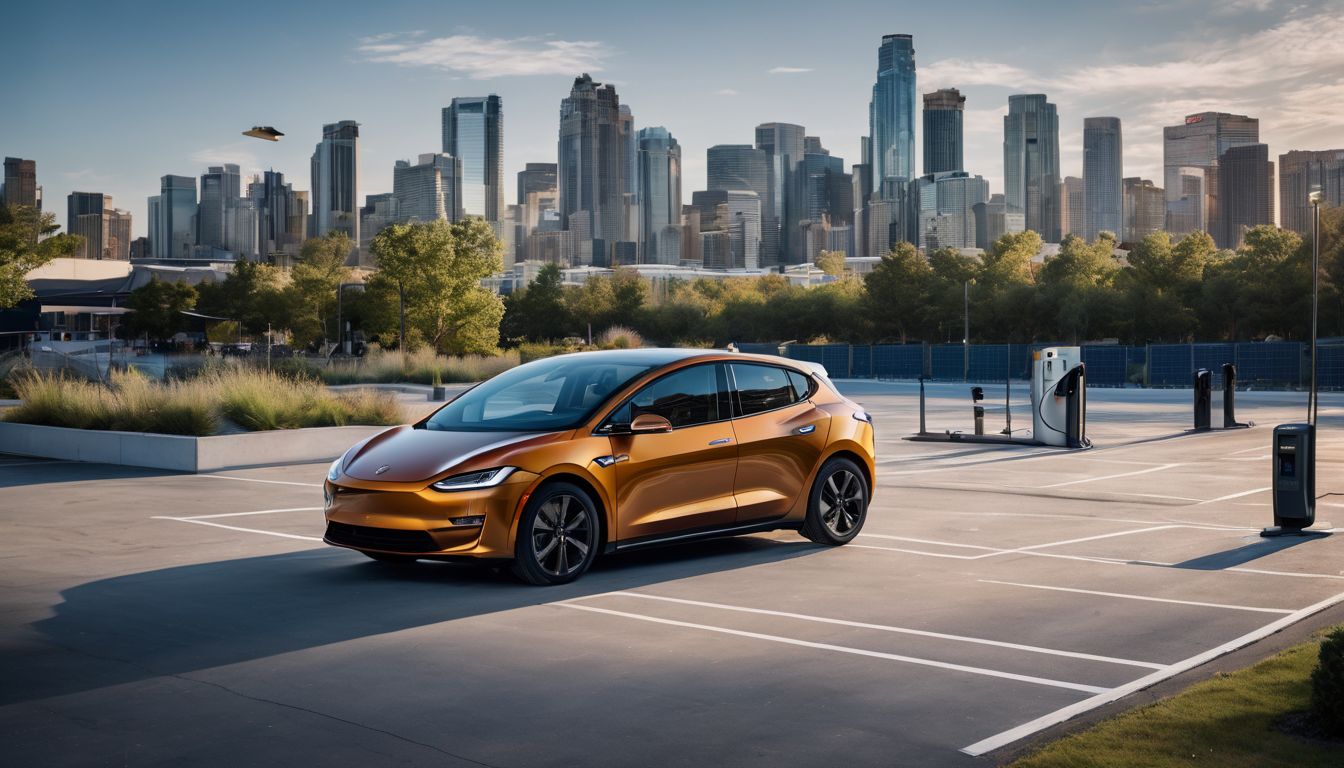We’re all striving for a breath of fresh air and a flourishing planet, aren’t we? But the journey towards lower emissions can often feel like a daunting challenge. Like many of you, we’ve been wrestling with just how significant our personal choices are when it comes to the global emission figures.
Picture this: if electric vehicles were to replace 30% of petrol and diesel cars by the year 2040, they have the potential to slash CO₂ emissions by an impressive 1.5 gigatonnes annually! Our latest blog post delves into why transitioning to electric vehicles is such a crucial piece of this intricate eco-puzzle.
So come along, grab a cuppa and let’s demystify some facts in this energised debate!
Key Takeaways
- Electric vehicles offer zero tailpipe emissions, contributing to cleaner air and reduced greenhouse gas emissions from transport.
- The overall environmental impact of electric cars depends on the source of electricity used for charging; using renewable energy can significantly lower carbon footprint.
- Despite producing emissions during manufacturing, particularly in battery production, electric vehicles still have a considerably lower lifecycle greenhouse gas emissions than petrol-powered cars.
- Widespread adoption of electric vehicles could lead to improved urban air quality by reducing harmful pollutants like nitrogen oxides and particulate matter.
- To maximise the benefits of electric vehicles in reducing global emissions, it’s essential to invest in renewable energy sources and develop sustainable manufacturing processes.
Emissions from Electric Vehicles
Electric vehicles produce zero tailpipe emissions, making them a cleaner alternative to traditional petrol-powered vehicles. However, it’s important to consider the emissions produced during electricity production for charging these vehicles.
Zero tailpipe emissions
We drive into the future with electric vehicles, leaving behind a trail of zero tailpipe emissions. Unlike their petrol-guzzling cousins, battery-electric cars don’t spew out harmful pollutants as they glide along the road.
As we switch gears towards sustainable transportation, our air gets a chance to clear up from planet-warming emissions.
Imagine cities where buses and cars emit nothing but a quiet hum. This vision becomes reality through widespread adoption of electric vehicle infrastructure that supports alternative fuel vehicles.
By choosing rides without exhaust fumes, we contribute directly to cutting down greenhouse gas emissions and improving air quality for everyone. It’s not just about moving forward; it’s about clearing the path for cleaner skies and healthier lives.
Electricity production emissions
Electricity production is a key factor influencing emissions from electric vehicles. The source of electricity used to charge these vehicles directly impacts the overall environmental impact.
Powering electric cars with renewable energy sources such as solar, wind, or hydroelectric power significantly reduces carbon emissions. However, reliance on fossil fuels for electricity generation can lead to a higher carbon footprint for electric vehicles.
As environmentally conscious individuals, it’s essential to consider the energy sources powering our electric vehicles and advocate for the transition towards clean and sustainable forms of electricity production.
Embracing renewable energy technologies can contribute to lowering emissions associated with electric vehicle use and support efforts in combating climate change.
How Electric Vehicles Help Tackle Climate Change
Electric vehicles help tackle climate change by reducing lifecycle greenhouse gas emissions and significantly cutting down on planet-warming emissions compared to petrol-powered vehicles.
This makes them an important part of the solution towards achieving a low carbon economy.
Reduction in lifecycle greenhouse gas emissions
Electric vehicles significantly reduce lifecycle greenhouse gas emissions compared to traditional petrol-powered cars. This reduction is due to the absence of tailpipe emissions, as well as the shift towards cleaner energy production.
By transitioning to electric vehicles, we can actively contribute to lowering planet-warming emissions and mitigating climate change. The adoption of alternative fuels plays a pivotal role in realising a low-carbon economy, driving the transition towards clean technology and sustainable transportation.
In addition to reducing CO2 emissions, widespread electric vehicle adoption has the potential to improve air quality and combat air pollution on a global scale. As environmentally conscious individuals, our support for clean energy and transportation emissions reductions will pave the way for a healthier planet and brighter future for generations to come.
Comparing to petrol-powered vehicles
Moving from a discussion on the reduction in lifecycle greenhouse gas emissions, we now turn our attention to how electric vehicles (EVs) stack up against their petrol-powered counterparts.
| Comparison Aspect | Electric Vehicles | Petrol-Powered Vehicles |
|---|---|---|
| Tailpipe Emissions | None | High; CO2 and pollutants |
| Fuel Source | Electricity (can be renewable) | Petroleum (non-renewable) |
| Efficiency | Higher (due to regenerative braking, etc.) | Lower (energy lost as heat) |
| Maintenance Costs | Lower (fewer moving parts) | Higher (more complex engines) |
| Energy Dependency | Reduces reliance on imported oil | Increases oil dependency |
| Operational Costs | Less expensive (electricity is cheaper than petrol) | More expensive (petrol costs subject to market fluctuations) |
| Climate Impact | Lower if powered by renewables | Consistently high |
As we can see, electric vehicles offer a promising alternative to traditional cars, with benefits that stretch beyond the immediate environmental impact.
The Myth of Electric Vehicles
Many people believe that electric vehicles are completely emissions-free, but the truth is that the manufacturing process and battery production contribute to greenhouse gas emissions.
It’s important to understand the full lifecycle impact of electric vehicles in order to accurately assess their environmental benefits.
Understanding the manufacturing process
The manufacturing process of battery electric cars plays a significant role in understanding the overall emissions impact. From mining and refining materials for batteries to assembling the vehicle, each stage contributes to planet-warming emissions.
Consequently, it is crucial for environmentally conscious individuals to consider the environmental implications at every step of the production process.
Throughout production, various emissions are generated from manufacturing components such as batteries and other key parts of electric vehicles. As a result, being mindful of these processes can guide decisions towards supporting climate change mitigation through sustainable manufacturing practices for battery electric vehicles.
Battery emissions
Battery emissions contribute to the environmental impact of electric vehicles. The manufacturing process, particularly of the batteries, releases CO2 and planet-warming emissions. Despite this, when comparing the lifecycle greenhouse gas emissions of battery electric cars to traditional petrol-powered vehicles, it’s evident that they have a significantly lower overall impact on the environment.
When considering widespread adoption of electric vehicles for reducing CO2 emissions and improving air quality, understanding and addressing battery emissions becomes crucial. By recognising these challenges associated with electric vehicle production, we can work towards developing cleaner and more sustainable manufacturing processes in order to make a positive difference for our planet.
The Benefits of Widespread Adoption of Electric Vehicles
– Electric vehicles can significantly reduce CO2 emissions and improve air quality in urban areas.
– Widespread adoption of electric vehicles could be a potential solution to air pollution in cities.
Reducing CO2 emissions
Electric cars significantly cut CO2 emissions, helping preserve the planet. They produce no tailpipe emissions, reducing harmful gases that contribute to climate change. By utilising clean energy sources for electricity production, electric vehicles minimise planet-warming emissions even further.
The shift towards electric vehicles holds substantial promise in curbing CO2 emissions. As we embrace these eco-friendly alternatives, we actively combat environmental degradation and support a sustainable future for our planet.
Improving air quality
Electric vehicles play a crucial role in improving air quality as they produce zero tailpipe emissions, which means less harmful pollutants like nitrogen oxides and particulate matter are released into the atmosphere.
By reducing the reliance on petrol-powered vehicles, we can decrease CO2 emissions and lower the levels of planet-warming emissions that contribute to climate change.
The widespread adoption of electric vehicles offers potential solutions to air pollution by creating cleaner urban environments. As more battery-electric cars hit the roads, we have an opportunity to make a positive impact on our surroundings and improve overall air quality for our communities and future generations.
Potential solutions to air pollution
Improving air quality is crucial for our environment. Here are potential solutions to air pollution:
- Investing in renewable energy sources such as solar and wind power to reduce the emissions from electricity production.
- Implementing stricter emission standards for industries and vehicles to curb harmful pollutants.
- Promoting the use of public transportation and cycling to decrease reliance on individual petrol-powered vehicles.
- Encouraging the adoption of electric vehicles through incentives and infrastructure development to reduce overall CO2 emissions.
Conclusion
In conclusion, electric vehicles have the potential to significantly reduce global emissions. They produce zero tailpipe emissions and contribute to lower CO2 levels. With widespread adoption, they could play a crucial role in tackling climate change and improving air quality.
The benefits of electric vehicles are clear, offering a promising solution to reducing planet-warming emissions and creating a healthier environment for future generations.
FAQs
1. Do electric vehicles really reduce global emissions?
Yes, battery-electric cars are designed to cut down on CO2 emissions and help lower the amount of planet-warming gases released into the atmosphere.
2. How do electric cars impact CO2 emissions compared to traditional vehicles?
Electric vehicles produce significantly less CO2 as they don’t burn fossil fuels like petrol or diesel-powered cars, which means fewer harmful emissions entering our air.
3. Can switching to electric vehicles make a big difference for the environment?
Switching to electric vehicles can greatly benefit our planet by reducing global emission levels and combating climate change over time.
4. Are all types of electric vehicles good for reducing global emissions?
Mostly yes, but it’s important that the electricity used for charging them comes from renewable sources to truly minimise their impact on global emissions.





